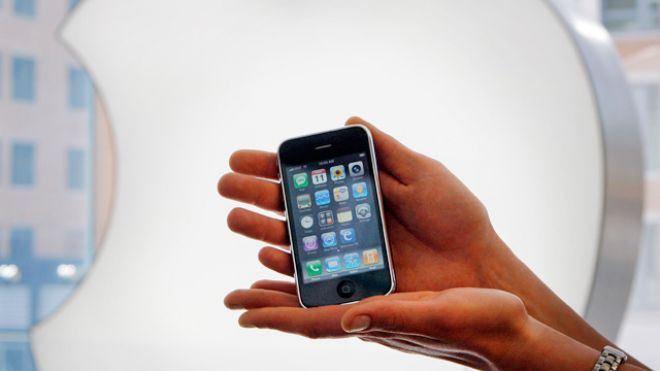Kelly Reeves was getting ready for a trip when her phone slipped into a sink full of water. Panic moment! She quickly picked up the wet device and tried to turn it on, but nothing worked. Her first reaction? She got dressed, drove to the nearest store, and bought a new model at full retail price.
Reeves, who runs KLR Communications, a media relations company, says she can’t afford to be without a phone. “I even carry it when I walk from my office to the kitchen,” she told FoxNews.com. Business contacts are too important to miss, and staying on schedule means having a phone at the ready at all times.
A new study conducted by security-authentication company SecurEnvoy finds that fear of losing your phone is a common ailment[疾病(尤指微恙), 不宁, 不安]. About 66 percent of those surveyed suffer from nomophobia (or “no mobile phone phobia”); interestingly, more women worry about losing their phone than men.
“I can’t go to a business dinner without everyone having their phones on the table,” Reeves said. “It's become commonplace for people to constantly check their phone during meetings, dinners, and dates. It's like the ability to be constantly reachable has made us fearful of missing out on something.”
SecurEnvoy clearly has an iron in the fire: The company makes software to protect your phone should you lose it, using two-factor authentication. But the rising prevalence(流行) of "nomophobia" -- and contemporary cellphone obsession -- has been confirmed by other studies.
Last year, a study in the journal of Personal and Ubiquitous Computing found that respondents checked their phone about 34 times per day on average. Those surveyed would check their phone about once every ten minutes. We’re all a little too obsessive about our gadgets, it seems.
Lookout Mobile Security also did a study late last year and found that 50 percent of respondents feel anxious when they do not have their phone present. When asked which item they would retrieve from a burning house, the top pick was a mobile phone -- ahead of a wallet, purse or a passport.
“Our phone is like our lifeline(救生索, 生命线) -- it contains all of our most sensitive information, so naturally there’s a lot of fear we have about losing it,” said Kevin Mahaffey, co-founder of Lookout Mobile Security.
Fortunately, there’s a solution.
Dr. Ramani Durvasula, a clinical psychologist and professor at California State University in Los Angeles, told FoxNews.com the first step is to figure out if you have nomophobia. Obsessively checking your phone is one thing, but the true sign of a problem is when the fear becomes so intense you can’t conduct business or go about your routine. (For her part, Reeves says she would have gone on the business trip anyway even if she hadn’t bought a new phone.)
Do you go to unusual lengths to makes sure you have your phone? Durvasula says that’s another sign of a problem. For example, you might use multiple apps for finding your phone and insure the device against theft. Or exhibit other obsessive behaviors and become irritated or even irrational if you think you’ve lost your phone or left it at home by accident. If you find you check your phone numerous times per hour, or a total of an hour per day, there may be a problem.
“[Nomophobia] may result in missing important information, such as new social contacts, so the person becomes anxious. It becomes a psychological problem or pathologic(病理的, 病态的) when the fear becomes a preoccupation or interferes with functioning in some way,” Durvasula told FoxNews.com.
Some of the treatments she recommends are similar to those for treating obsessive compulsive disorder (OCD) and anxiety attacks: leaving the phone behind and not checking e-mail or text messages, and then learning to tolerate the subsequent anxiety. Even if this leads to a high level of worry and stress, she says, the solution is to push through the fear and learn to cope with not having your phone.
Of course, there are also technological options. Luis Levy, a co-founder at Novy PR, says he uses an app called Cerberus that can automatically track the location of his phone. To find it, he can just go to a Web site, login, and see the device’s location.
He also insures his phone through a service called Asurion. The company’s description of its product reads like a prescription for anxiety: “60 million phones are lost, stolen or damaged each year. You’ll have complete peace of mind knowing that your device is protected and you can quickly reconnect with family, friends and work, as soon as the very next day!”
Apps like those from Lookout and through wireless carriers such as Verizon and T-Mobile can sound an alarm when a phone is lost. And, new products like the Zomm and BiKN warn you about theft.
Part of the anxiety has to do with changing social norms. Reeves says some of the pressure she feels is that contacts often expect an immediate response; with today’s smartphones, there’s no such thing as being out of touch.
“Maybe I need to see a doctor,” Reeves joked later -- a message she sent from her iPhone.


